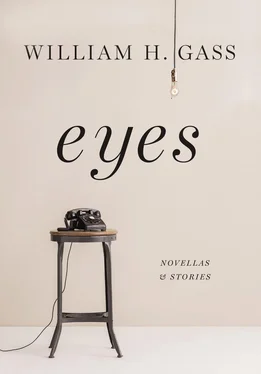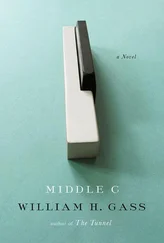That’s all I remember about that sort of juice. Should I start over? There is such a lot of juice: orange with pineapple, pulp or not, vitamins added, shake well before pouring. Cider — not likely in this case — too seasonal. There’s more to remember. T omato. Fits. Not an edge piece, though. Later in life, when the doctors put dad on a salt-free diet, we had to keep bottles of that thick red sodium solution out of his reach. He did love it. His doctors recommended cranberry. Dad mustered his patience — a drill for which he rarely called the roll — diet, blood pressure, temperature, pills, and such. He swallowed the whole lot in one greedy gulp. Cranberry was a fruit juice, he informed his physicians; what he wanted was vegetable juice. One doctor — we laugh about it now — had the gumption to tell dad that the tomato was a fruit. The man was fired in short order. Well, not exactly fired. Not exactly short order. Dad was a coward about most things if he had to face them with his face. He just never went back to that surgeon’s shop. So I must have meant by “short order” that dad had ducked the doc in three states: meeting, memory, or mention. Dad knew the fellow was right about tomatoes, even the yellow ones, and dad knew that we knew. Such a realization stung like a sand ant.
he zip necessary to get my tin train going when I gradually moved the handle that lay across the top of the heavy black box like a hand on a clock’s face. “Transinformer” was dad’s word for it. The word was quite heavy for so small a cube. Full of its importance, dad said, but I was ready to give it all the importance it wanted. It had a name — the cube did, the word did not. Dial-a-speed. He said it made the juice somehow juicier so the juice was willing to shoot onto and through the train’s tracks, though you couldn’t tell by just looking at them that anything was different from one minute to the next; and the engine sucked up the juice that was lying there wetting the rails, and everything about how the train ran after he reached that point in his explanation, dad said, was like our Studebaker burning gas. Excep That’s all I remember.
t we got good mileage out of the old bitch. She was more reliable than my tin train. Tin train, tin train, come out and play, tin train. It would go lickety down a length of track and then slow to a maunder as if there were a window it wanted to look through or a tree that stood out, funny reasons to groan to a stop. Even if Indians were chasing the engine or perhaps Pauline lay roped to the ties, it would utter a slow groan — hiss own, hiss own — it was always the train, the train that told the story I was dressing my world with. Toy train, toy train, toy train, let’s take a trip, toy train. Dad showed me how to sandpaper the track. This made, he said, for a better contact. Your track’s been gathering grime since last Christmas, he reminded me. He was so fond of reminiscence. Not because remembering was something he could do well because he couldn’t do it well, huge hunks of his life had disappeared as if they had never happened, like those pieces that get lost immediately they are released from the puzzle box, and maybe they hadn’t happened, but his life had possibly skipped a beat now and then; I know my life has holes at its elbows and its knees; it is a tatter of tales, mostly incomplete; my thin bones show. I know. I know. When our present date gets eaten, some crumbs, some smears will remain to mark the plate. Licked unclean. Unclean. Then the past that we’ve devoured, we excrete. This manure feeds the meat of a new moment. Isn’t that cheery?
Dad would with a smile ask me how many passengers had perished in the most recent crash of my train when it scampered off into the dismal swamps of El Gard beneath our dining table’s drop leaf. He would smile because I would always reply: at true play there are no consequences, although I hardly knew what the two words meant. Not even broken bones? Maybe seven suitcases were flung about and their contents scattered. Wreckage of any kind? Few dishes were shaken even in the dining car when I picked the engine up. So I sent back his smart-ass smile. I didn’t plan on staging an accident at the expense of my presently blooming paper lake.
I always hoped that a naked lady lay concealed beneath the countless connections I was supposed to make, but no luck, instead I possessed the most conventional box of jigsaw pieces imaginable whose garish colors clashed with their absurd shapes depicting a childish drawing. Green for crayoned grass, blue for cloudless sky, smoke for smoke — the clichés seemed essential to any childhood scribble — house with chimney, front walk that wiggles, floating stick figures except, in a corner, for no reason at all, one of the three bears, painted to look stuffed — the whole thing sawn out of some cardboard at midnight by a drunken tailor.
My parents could not bare me
My parents bore me
My parents brought me up to be their flogging post.
My parents used me for their flogging post. And would say now that I’m a whinery. I wrote numbers on the backs of the bear puzzle pieces — the nature of nature from none to five hundred. Now I can reassemble the damn thing in less time than it takes for you to type — oh — Seventy!
After I have been dumped on by dear ole dad, and there is a mildly broken spring to my walk, I spit on my childhood rendition of his face. Together they paint a pretty picture…the spill of spit…a pretty picture here…the swill of spit…a pretty picture there…the smear of spit…fragile as fragile glass…a pretty picture…
After every Christmas, when the needles of the spruce hurt the hands that handle them — ow! t inder! — I pack my train into the cardboard carton it came in: engine, cars, track, transinformer, station. Just so. There was no room for anything extra Santa might have brought. Those things — the recent gifts — were auntie-bagged. I remember about bagging. My aunt Nector made sacks from scraps of cloth and along their open edges threaded a drawstring that I pulled when I was hanging disobedient soldiers. Then I stashed the bags on the bottom and at the right-hand corner of the toy chest: artificial trees, alphabet blocks, a dollhouse bench, sign that said SLOW — CHILDREN CROSSING. Aunt Nector sewed me a small doll dressed like a pilgrim for Thanksgiving that I used to tie to the tracks, but the train would hit her and run off the rails instead of cutting her in two the way it was supposed to. A little more sanding made the tin shine like new-poured iron. Nevertheless, I found that the most rubbed sections of rail were always where the problem was. The engine would jump forward for a moment, then — look out — jerk to a stop — ouch — up and down the length of my entire train. Including all three streamlined cars. The Silver Star. It was a Streamliner a lot like a real one I’d seen in magazines. Out there where the air was clean. Excep
Aunt Nector was plenty stupid not to know when it was Christmas and when it was Halloween, when it was Easter and when it was Rosh Hashanah, when it was President’s Day, when it was the Ruination of the World.
Tuh, that’s it: t for me and t for you…damn if dad didn’t do what he threatened to: he kept all the edges and threw the rest away. He said they symbolized forgotten soldiers but I think it stood for a penitentiary where thoughts that were both dirty and hilarious were kept, eating gruel with a spoon.
Everybody wanted to ride on the Streamliner because
Let me think.
Out there where the air was clear.
Out where? There!
t these little pieces are always the hardes t though my typewriter will double ells automatically hardest got it fits
In any case, the bags were easy ways to wrap presents and they could be reused every year like the same old excuses. My aunt liked to sponsor the second chance. Gift pouches she called them. In the kangaroo of Christmas. Hop a long way from the North Pole. Australians, my dad said, slept upsidedown like bats. They freed Aunt Nector from several concerns: now she wouldn’t have to unwrap packages as if they were bombs; now she needn’t fear of tearing the tissue paper or cutting the wrong string; it would no longer be necessary to iron the creases flat for me where, at each corner, the foldings had become crimped, so I could lay them away in an equally flat box saved for the purpose that was remarkably no thicker than a tie, though it was roomier in every other direction, as if it might have held maps once, instead of sheets of secondhand wrappings, and a cache that became a symbol of her penny ante thrif
Читать дальше












